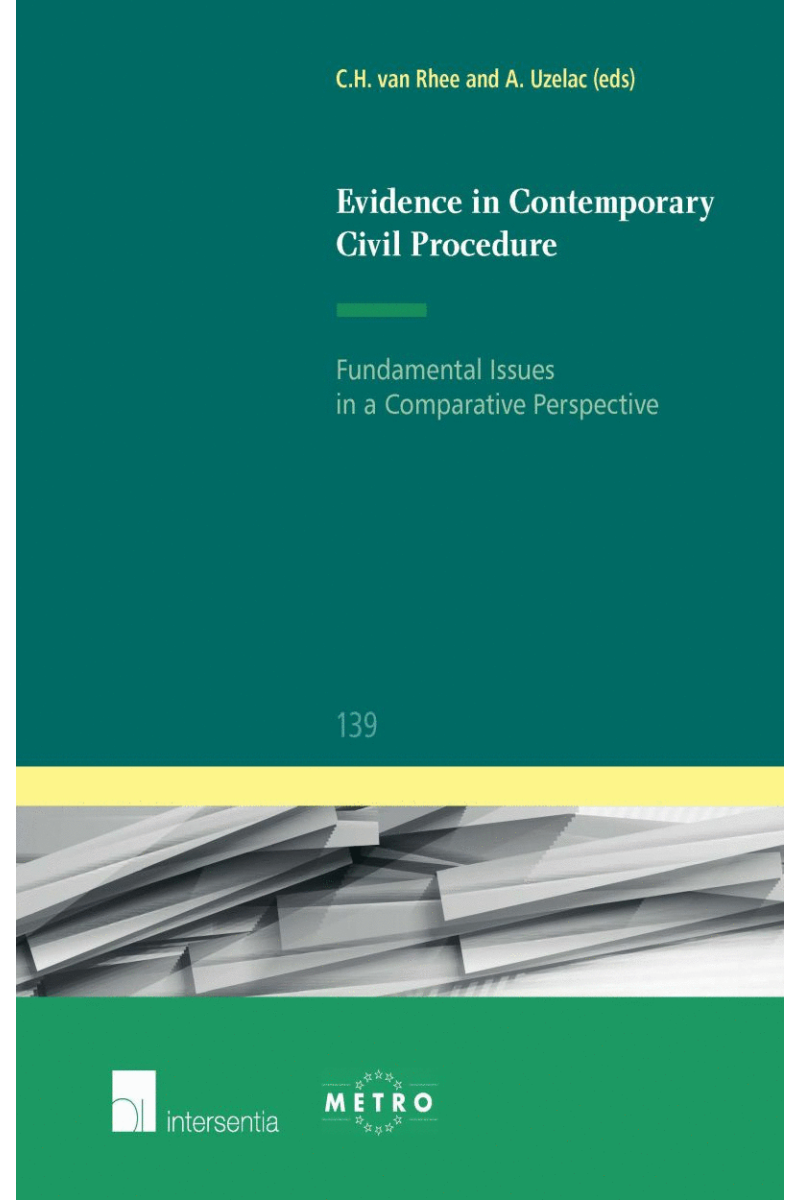 maestro
mastercard
visa
maestro
mastercard
visa

Evidence in Contemporary Civil Procedure
Fundamental Issues in a Comparative Perspective

Since the start of the new millennium, many contemporary jurisdictions have been revisiting the fundamental principles of their civil procedures. Even the core areas of the civil process are not left untouched, including the way in which evidence is introduced, collected and presented in court. One generator of the reforms in the field of evidence-taking in recent decades has been slow and inefficient litigation. Both in Europe and globally, reaching a balance between the demands of factual accuracy and the need to adjudicate disputes in a swift, cost-effective and efficient way is still one of the key challenges. The second reason that many countries are reforming their law of evidence is related to cultural and technological changes in modern societies. As the balance between, on the one side, traditional human rights such as the right to privacy and due process is shifting towards, on the other side, the modern need for security, efficiency and quick access to justice, the perception of what is admissible or not in the context of evidence-taking is changing as well. In the same sense, the fast pace of modern life commands different practices of fact-finding, accompanied by new methods of selection of evidence that are appropriate for this purpose. Last but not least, the overwhelming penetration of new technologies into all spheres of public and private life has the capacity to dramatically change the methods of the collection and presentation of evidence.
Exploring these issues, the editors of this book invited the contributors to reflect on how these trends affect the situation in their countries and to present their views on further developments, both nationally and in comparison with the developments in other countries and regions. A further goal was to inquire whether, in spite of national differences that are still dominant, the approaches to civil evidence are converging, and whether reforms affecting fact-finding have a chance of leading to some forms of harmonization.
This publication has been produced with the financial support of the 2007-2013 Civil Justice Programme of the European Union. The contents of this publication are the sole responsibility of authors and can in no way be taken to reflect the views of the European Commission.
| Type of product | Book |
|---|---|
| Format | Paperback |
| EAN / ISSN | 9781780683386 / 9781780685250 |
| Series name | Ius Commune Europaeum |
| Weight | 640 g |
| Status | Available |
| Number of pages | xvi + 364 p. |
| Access to exercice | No |
| Publisher | Intersentia |
| Language | English |
| Publication Date | Aug 10, 2015 |
| Available on Strada Belgique | No |
| Available on Strada Europe | No |
| Available on Strada Luxembourg | No |
Downloads
- Table of Contents
- INTRODUCTION
- EVIDENCE IN CIVIL PROCEDURE: THE FUNDAMENTALS IN LIGHT OF THE 21ST CENTURY
C.H. van Rhee, Alan Uzelac - FUNDAMENTAL AND OTHER PRINCIPLES OF EVIDENCE IN CIVIL LITIGATION
- EVIDENCE AND THE PRINCIPLE OF PROPORTIONALITY. HOW TO GET RID OF EXPENSIVE AND TIME-CONSUMING EVIDENCE?
Alan Uzelac - DISCLOSURE OF DOCUMENTS IN CIVIL PROCEDURE: THE PRIVILEGE AGAINST SELFINCRIMINATION OR A QUEST FOR PROCEDURAL FAIRNESS AND SUBSTANTIVE JUSTICE
Ales Galic - PRECLUSION OF LATE ALLEGATIONS AND EVIDENCE AS A TOOL TO INCREASE THE EFFICIENCY OF CIVIL PROCEEDINGS IN POLAND: A SHORT STORY OF THE UGLY PAST AND THE WAY TO A BRIGHT FUTURE
Bartosz Karolczyk - THE ‘RIGHT TO PROOF’ AND THE ‘LOYALTY PRINCIPLE’: A FRENCH PERSPECTIVE
Emmanuel Jeuland - RESTRICTIONS ON THE ADMISSIBILITY OF EVIDENCE
Vesna Rijavec, Tomaz Kerestes - TAKING LENIENCY DOCUMENTS AS EVIDENCE IN DAMAGES ACTIONS IN CASES OF COMPETITION LAW INFRINGEMENT
Martina Repas - LOST IN TRANSLATION? LANGUAGE DIFFERENCES AND THEIR IMPACT ON EVIDENCETAKING IN LITIGATION
Elisabetta Silvestri - EVIDENCE, INFORMATION TECHNOLOGY AND PRINCIPLES OF CIVIL PROCEDURE – THE HUNGARIAN PERSPECTIVE
Viktoria Harsagi - THE POTENTIAL IMPACT OF ELECTRONIC PROCEEDINGS ON TRADITIONAL PRINCIPLES OF CIVIL PROCEDURE – THE SLOVENIAN EXPERIENCE
Tjasa Ivanc - TYPES OF EVIDENCE IN CIVIL LITIGATION
- WITNESS TESTIMONY IN DUTCH CIVIL PROCEDURE: FACTS, FIGURES AND STATISTICAL RELATIONS
F. Hoogers, Fokke Fernhout, H. Jans, V. Poels - CURBING ADVERSARIAL EXCESSES: AN EVALUATION OF THE EXPERT EVIDENCE REGIME IN HONG KONG AFTER THE CIVIL JUSTICE REFORM (WITH A FOCUSED STUDY ON PERSONAL INJURY LITIGATION)
Peter Chan, Ubaid Rehman - THE NEW RULES OF EXPERT EVIDENCE IN MACEDONIAN CIVIL PROCEDURE: ARE THEY A FAILED EFFORT AT REFORM?
Tatjana Zoroska-Kamilovska - EVIDENCE IN ARBITRATION AND NATIONAL CIVIL LITIGATION
- EVIDENCE: LEARNING FROM ARBITRATION
Paul Oberhammer - EVIDENCE IN CIVIL PROCEDURE IN THE NETHERLANDS: TRADITION AND MODERNITY
C.H. van Rhee - TAKING OF EVIDENCE IN CROATIAN APPELLATE COURTS: WHY NO FACT-FINDING AT SECOND INSTANCE?
Sladana Aras Kramar - EVOLUTION OF THE POWERS OF THE JUDGE AND THE POWERS OF THE PARTIES REGARDING THE TAKING OF EVIDENCE IN SOUTH AFRICA
Daniel E van Loggerenberg - EVIDENCE IN CROSS BORDER CIVIL LITIGATION
- THE 1970 HAGUE EVIDENCE CONVENTION, THE EUROPEAN UNION AND THE 2001 EU EVIDENCE REGULATION - INTERFACES
Martin Orgonik a Jiri Valdhans, David Sehnalek